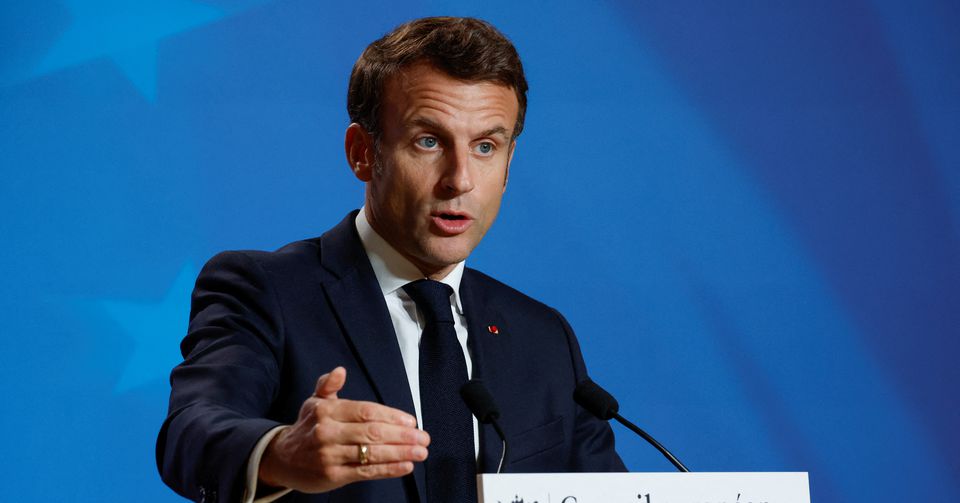EUROPE and WASHINGTON — After Russia unleashed the largest land war in Europesince the end of World War II, exposing Europeandefense capabilities as lacking, now may not be the best time to fantasize about the continent standing alone militarily.
But French President Emmanuel Macron is doing just that, sparking a fresh debate in Europe about where the continent is headed in the grand squeeze among the United States, China and Russia.
Strategic autonomy — the ability to provide for one’s own security,he told journalists aboard the plane flying him home from a visit with Chinese President Xi Jinping in April — must become Europe’s organizing principle. Without it, Macron said, Europe risks becoming a “vassal” to other powers, including the United States, which could be on a collision course with China over Taiwan’s independence.
The problem, according to analysts, is strategic autonomy means different things to different governments in Europe, and there’s no defined end state of when it might be realized. While there is a shared understanding that a new beefiness in defense matters is vital, the degree of continued reliance on the United States — with its atomic weapons and troop deployments across Europe — as the ultimate security guarantor is where opinions collide.
There is a widening gap now between Eastern and Western European countries along those lines. In Romania, for example, any military measures to protect the eastern front are perceived as having limited value unless they involve American boots on the ground, ideally stationed there forever.
In Western European governments, some still expect the bloc’s economic prowess and mere proclamations about Europe’s own defense ambitions to insulate them from Russian aggression.
Christian Mölling, who leads the Center for Security and Defense at the Berlin-based German Council on Foreign Relations, said Macron’s insistence on the term strategic autonomy is something of an anomaly among European leaders because it conveys a desire to be autonomous from others, namely Washington.
Macron, Mölling explained, “was mainly speaking for himself,” projecting France’s national vision onto the rest of Europe.
Germany prefers softer terms, like European sovereignty, that simply express an ambition to act independently during crises, according to Sophia Besch, a Europe analyst at the Washington-based Carnegie Endowment for International Peace.
“There is too much scorched earth associated with the term ‘strategic autonomy,’ ” she said, referring to the years of futile discussions about the term by think tanks and politicians that suddenly shifted from academic to concrete when Russia invaded Ukraine last year.
Definitions aside, Russia’s assault has highlighted Europe’s dependence on not just U.S. military capabilities but also American leadership in orchestrating a trans-Atlantic response, Besch added.
Fickle friends?
Nevertheless, Europeans sense the writing on the wall calling for a greater degree of autonomy, driven by a mixture of increased defense spending and improved trust in the collective; that’s because America’s focus may shift to competition with China.
Also possible is a scenario in which a future U.S. president could simply stop caring about Europe’s security, or actively sabotage key institutions like the European Union or NATO.
“I do not think the idea of strategic autonomy is dead,” said Bastian Giegerich, the director of defense and military analysis at the International Institute for Strategic Studies, a think tank based in London. “One of the main drivers of it remains intact: the sense that the U.S. in the long run will be drawn away from Europe and will focus on the Indo-Pacific.”
“For the time being, however, for many European capitals — though not all — strategic autonomy takes a back seat, quite rightly in my view, to defeating Russia,” Giegerich added.
Arturo Varvelli, who leads Rome’s division of the European Council on Foreign Relations think tank, said strategic autonomy must remain a goal, despite Ukraine.
“We must reduce Europe’s dependencies when it comes to technology and energy as well as defense. All these elements are still on the table,” he said.
“If we give up, we will depend on China for green technology and the U.S. for defense,” Varvelli added. “Believing we can lean on the U.S. is a bigger illusion than saying we can be autonomous.”
But building the muscles to create strategic autonomy — or whatever term one prefers — remains a long-term effort despite attempts by the EU to raise its defensive profile.
The objective is “at this moment very far away,” said Ester Sabatino, a research analyst at IISS’ office in Berlin.
Only now are countries like Germany, which for decades considered Russia a partner, starting to spend more on defense; however, it appears unlikely Germany will reach the NATO target to spend 2% of gross domestic product on defense in the foreseeable future.
The peace dividend following the collapse of the Soviet Union has left skeletal combat formations in place in many nations. The main problem has been a lack of a common threat perception, as well as the requirement for unanimity for EU decision-making for initiatives such as capability development planning, Sabatino told Defense News.
“If there is no common perception of the threat, then how are you supposed to organize the security architecture to respond to [those threats]?” she asked.
The EU is struggling against a “legacy of the past” where members along the eastern and northern borders, for example, saw Russia as a much more existential threat than did France or Germany. While the war in Ukraine has served as a reality check that Russia is today’s main threat, there remains a prioritization issue.
“In their pool of national threats, they continue to have other threats, like terrorism or instability in the Sahel,” Sabatino said. “That’s the case of France, or migration when it comes to Italy. There is a kind of recalibration [occurring], but the legacy of the past is there.”
To be sure, the EU and its member states have made financial and materiel contributions to Ukraine’s defense that were previously unthinkable.
Josep Borrell, the bloc’s defense and foreign policy chief, used a recent forum to trumpet how far those security efforts have come.
The EU deployed its first collective military operations two decades ago, first in the Western Balkans and then in the Democratic Republic of the Congo, Borrell told representatives from all 27 EU member states and the more than 50 partner nations present at the first biennial Schuman Security and Defence Forum, hosted by the European Parliament in Brussels in March.
Sincethen, more than 40 military operations took place across all continents, he noted. That being said, “it is fair to say that our response to the war in Ukraine in particular has changed the way we, in Europe, regard our own security and defense agenda,” Borrell added.
TheEU collectively has provided about €3.6 billion (U.S. $4 billion)worth of support to Ukraine’s military via the European Peace Facility, the union’s off-budget, military aid mechanism. On March 20, the bloc approved an additional €2 billion to spend via the EPF, split into two pots: one to gather up a million rounds of ammunition from national stockpiles to rapidly send to Ukraine’s front lines; and the other to begin the procurement of new ammunition of various types to replenish members’ stocks, while keeping up deliveries to Ukraine.
:quality(70)/cloudfront-us-east-1.images.arcpublishing.com/archetype/HAEAHYFZAJH27CTDRF4PNDGQ34.jpg)
A tiny test case
While the world watches Russia’s ongoing attack on Ukraine, fears are growing in Moldova that it may be next in the firing line, after the country’s president announced Moscow-backedsaboteurs were supportinga coup against the country’s pro-European government.
Sandwiched between Ukraine and Romania, the former Soviet republic is in line for European Union membership, hoping the bloc will keep it safe from Russian President Vladimir Putin’s ambitions.
But with Europe heavily dependent on U.S. cash and weaponry to back Ukraine, the question is: How useful a guardian angel can Europe be to countries now trembling on Russia’s flank?
Nathalie Tocci, the head of the Rome-based think tank IAI, said there is no doubt Europe’s hope of being able to tackle external threats alone was exposed by the Ukraine war, although not in the way one might expect.
“It’s not so much because the U.S. is doing the heavy lifting when it comes to supporting Kyiv, since the EU and U.K. are doing a lot when taken together, but it’s because Europe’s defense procurement dependency on the U.S. is increasing,” she said.
:quality(70)/cloudfront-us-east-1.images.arcpublishing.com/archetype/DFVQ2LJ5RBDMPJRJIUXAEBNYEA.jpg)
When European defense budgets rose at the outbreak of the war, some envisaged a boom for common European programs. However, the opposite occurred, as nations opted for quick, off-the-shelf purchases, often from the U.S., including F-35 fighter jets for Germany and Abrams tanks for Poland.
“This is bad news for Europe, but also for the U.S., since in a world in which the U.S. is no longer the global hegemon, it would surely have an interest in having more capable rather than merely dependent partners,” Tocci said.
‘Wild growth’ of arms
Russia’s invasion of Ukraine last year sparked a wave of weapons purchases in Europe that were animated primarily by immediate, national needs. Poland, for example, bought not only American-made tanks but found a new and faster supplier for armor and artillery in South Korea.
Defense officials in Washington have admitted they see new export opportunities in restocking European armories depleted by donations to Ukraine, stoking fears among European arms companies they are missing out.
But that dynamic doesn’t have to be a bad thing, Mölling said. He noted the “wild growth” of weaponry, however uncoordinated, could serve as something of a “primordial soup” from which a more orderly arms mix could be shaped in the coming years.
:quality(70)/cloudfront-us-east-1.images.arcpublishing.com/archetype/JX4XJVXQHRADBJML7HXRCDDHI4.jpg)
“We have reached a fork in the road,” Mölling told Defense News. Whereas the EU, with its limited defense mandate, has focused on the seams of national capabilities, essentially seeking gains by way of growing connective tissue, Europe now needs sheer mass, he added.
In that thinking, officials may need to reevaluate the long-standing EU push for defense industry consolidation. It hasn’t worked anyway, in part because Brussels cannot override national industrial jockeying, according to Mölling.
In the current phase, the origin of capabilities shouldn’t matter, he said. “We should take what we can get if it helps Europe’s defense.”
British outlook
Meanwhile, Britain is going through its own reassessment of defense and security priorities. From its perch outside the EU, London has been a key player from the start in galvanizing support for Ukraine on both sides of the Atlantic.
And with its role in the massive AUKUS project — partly aimed at providing nuclear-powered submarines to Australia in tandem with the United States — anAsia-Pacific focus is set to become a major muscle movement in British defense priorities for decades, while defense ties with the EU are less pronounced than they once were.
The British government released its latest take on the country’s place in the world of defense, security and foreign policy on March 13 with what it termed a“refresh” of an integrated review published in 2021.
Much has changed in the two years since the government of then-Prime Minister Boris Johnson unveiled that review: Russia’s attack on Ukraine, post-Brexit politics (the U.K.’s departure from the EU) and an ailing economy have significantly affected the strategic autonomy landscape.
From a political perspective, the British government has been on a roller coaster, with the country now on its third prime minister in a year since Johnson exited No. 10 Downing Street under a cloud.
The change from Johnson to the incumbent, Rishi Sunak, altered how London defines strategic autonomy, said Dan Darling, the senior analyst at Forecast International covering Europe, Asia, Australia and the Pacific Rim.
“Under Johnson, strategic autonomy meant Brexit freeing the U.K. from the diktats of Brussels. It meant an untethered Britain free to follow its own course, chiefly through a ‘Global Britain’ ambition that would see London forge relationships through bilateral, multilateral and coalition means and bolster influence across the world,” he said. “Under Rishi Sunak, it appears to mean closer ties with the European Union, with an emphasis on continuing the Johnson Cabinet’s strong record of support for Ukraine, plus remaining vigilant about the looming challenge of China.”
But for all the talk of strategic autonomy ambitions and a review that seems to prioritize soft power over hard, the billion-pound question is whether Britain has the military wherewithal to achieve its goals.
Indeed, that question applies to all of Europe.
Germany’s “Zeitenwende” — Chancellor Olaf Scholz’s declaration of a renewed emphasis on defense last year that came with a €100 billion special fund — has become something of a harbinger on whether strategic autonomy will have teeth.
So far, critics have said, the money is flowing too slowly.
Source : Defense News
















